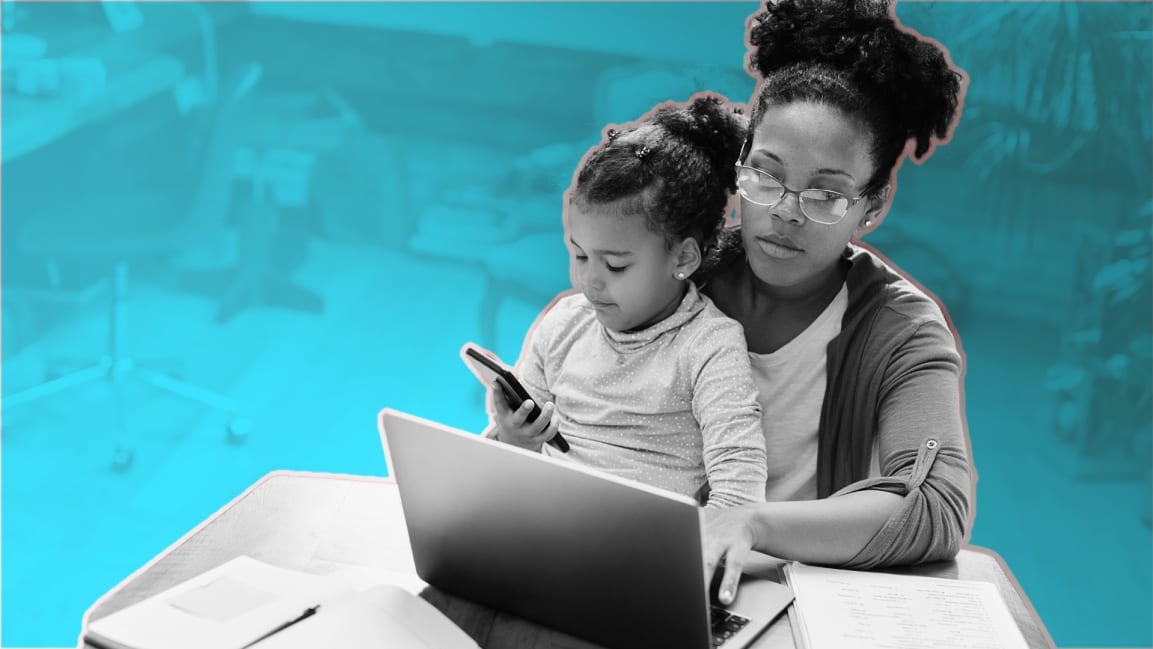We need to dismantle the productivity lie that demands we ‘do it all’
My mother grew up in Ughelli-South, a small village located in Delta State, South-South region of Nigeria. Right after finishing high school, she married my father, a pastor, and abandoned her plans of going to college. Together, they moved to Lagos and raised six children. From this brief biography, you might imagine that my mother was a tired woman, hands chafed and back bowed by the demands of domestic life in a developing country.
The truth is my mother had more help around the house than the average American woman could dream of in 2021. I never saw my mother wash dishes. I never saw her do laundry. From time to time, she would cook—after the fish had been washed, the peppers had been sliced and the rice was already boiling.
When she decided to go back to school to eventually earn a degree, the solution was simple: She found help. Often without asking. My siblings and I were tended to by a village of paid and unpaid caregivers—nannies, aunties, uncles and my father’s congregants. She had support wherever she turned.
That’s why, when I recently had my fourth child here in America and asked her to fly over for assistance, she replied, mystified, “I’m coming to support you—who are the other people who can help?”
The answer, for most American mothers, is no one. Just a few short weeks after women arrive home with their new baby, the meal train chugs to a stop, and friends’ effusive offers to babysit become a “Sorry, busy!” Since the majority of fathers in the U.S. take fewer than 10 days of paternity leave, and many grandmothers are still employed or live across the country, most women are left to navigate new motherhood alone. It’s a pattern of maternal isolation that persists even as women return to paid work. We might send our kids to daycare during office hours, but every other family task falls squarely on our shoulders. Meal making. Grocery shopping. Party planning. At times, the list feels infinite.
Support is different on the other side of the ocean. My mom friends in Nigeria have full-time housekeepers and nannies that allow them to fully pursue their career ambitions. On the weekends, they are able to enjoy time with their children, rather than rushing to accomplish the chores and errands they weren’t able to tackle during the workweek. In the U.S., this is a standard of living that’s afforded only to parents in the top tax brackets.
Of course, the exorbitant cost of childcare is a big reason why American parents can’t staff up like our Nigerian counterparts. In the US, the average monthly cost of care for one 2-year-old is $1,100—just slightly less than the average homeowners’ monthly mortgage payment. Other wealthy countries help offset the cost of childcare, mainly through subsidies. They contribute an average of $14,000 per year for a toddler’s care. In the U.S., it’s just $500.
But it’s going to take more than just affordable child care to alleviate the crushing domestic burden on American moms who work outside the home. It’s going to take a cultural shift, as well. In America, our value as mothers is too often tied to our productivity at home. By Western standards, a “good” mom spends hours planning and preparing healthy Bento box lunches and personally ferrying her children to a myriad of enriching after-school activities, no matter if she works outside the home or not. Essentially, we’ve been convinced we have to be a “super mom” or we’re failing. Just take a look at Instagram, and you’ll find plenty of women working their way up the corporate ladder while cooking 5-star family meals and running the New York City Marathon in their spare time. The message is so insidious that when we find ourselves with free time, we believe we should be folding laundry, scrubbing toilets, or ordering supplies. We equate idleness at home with being unproductive. (Not coincidentally, studies show that dads have more leisure time at home than moms.)
What’s worse, we’re judged when we do opt-out. Research shows that moms who opt out of parenting duties, such as taking full maternity leave, are seen as worse parents and less desirable partners. That’s likely why American mothers are often reluctant to accept help even when it’s available. A recent report made in partnership with Melinda French Gates’s Pivotal Ventures shows that men are more willing to outsource household tasks than women. When asked how much they’d be willing to pay to eliminate one hour of work on the “household task that causes you the most stress,” dads said an average of $122. Moms said $89. Dads were also willing to pay about $50 more on average to reduce an hour of stress about their child’s needs (e.g., their safety, development, coordinating their activities, etc.)
As the founder and CEO of Mother Honestly, a platform that provides solutions for women at work and in life, moms often tell me they feel like they’re failing their kids if they aren’t caring for them personally and that it’s easier to do things themselves so they are done “right.” But this go-it-alone pursuit of perfection has real consequences. A study of American and British moms found that those who felt pressure to be perfect had higher rates of parental burnout and lower work-family balance, which in turn led to lower career ambitions. Notably, those moms also exhibited more “maternal gatekeeping behaviors,” i.e. taking over family tasks from one’s partner.
As a result of this exhausting pursuit of productivity, moms in most Western countries now spend more time with their children than their grandmothers did in the mid-60s, even though a far greater percentage of moms work outside the home. We are spending more time than ever on both paid work and parenting, and the load is simply unsustainable—as the pandemic made perfectly clear.
Certainly, American moms need partners who pull their weight. Working moms spend more time than working dads on childcare and chores—and far more time on household management. But even my friends who have managed to strike fairly equitable arrangements are drowning. In fact, fathers report struggling with work-life balance just as much as mothers. That could have something to do with the increasingly long hours we work in America—another casualty in our endless pursuit of productivity. Simply put, the burden of being a working parent in America in 2021 is too big for two people to handle.
First, we have to make it easier for parents to afford help. The child care provisions in the Build Back Better Act would certainly allow more parents to pay for care, and in turn, keep more women in the workforce. We also have to make it more convenient to find qualified help. One thing I hear a lot from moms is that it’s simply too much work to hire a sitter for date night—that it’s not worth the effort. (Even though research shows that investing in help is good for your relationship.) Women and families don’t have access to frictionless support.
But we also have to dismantle the Western idea of domestic productivity that demands we “do it all.” Fighting back against decades of cultural messaging that valorizes overwork won’t be easy, but here are a few steps I suggest to start.
1. Put your family second. We are doing too much and we are paying for it with our mental and physical health. In fact, 93% of over 2,000 women surveyed at Mother Honestly believe they are burned out and are failing themselves. Prioritizing ourselves, listening to our body and health will be crucial in the next phase of the pandemic as we settle into a hybrid or remote work environment.
2. Ruthlessly remove the unimportant. Women should take an inventory of how they spend their time, and cut out what’s not value-adding. Do you really need to spend three days sewing a Halloween outfit or can that be picked up at a big box store? In an era where there is so much to do, and so little time to do it, we have got to get clear about what is truly important and stick to it.
3. Get off DIY mode and redistribute the labor: Review your complete list of chores at home, and redistribute tasks to other family members—your partner, big kids, and outsourced help, if you can afford it. Studies show that people derive more joy and happiness from getting a housecleaner than purchasing a TV, so if cash needs to be redirected from a large purchase to getting support on the homefront, then prioritize that support without apology.
Take a page from my mother’s example. Your children will not remember when you did the laundry, put away the groceries, or scrubbed the toilet for the millionth time—but they will remember when you were emotionally present. They will remember when you said yes to playing outside in the rain and took the time to share their Paw Patrol grievances. And just as importantly, those are the memories you will cherish too.
Blessing Adesiyan is the founder and CEO of Mother Honestly and Villo.
Fast Company , Read Full Story
(50)



